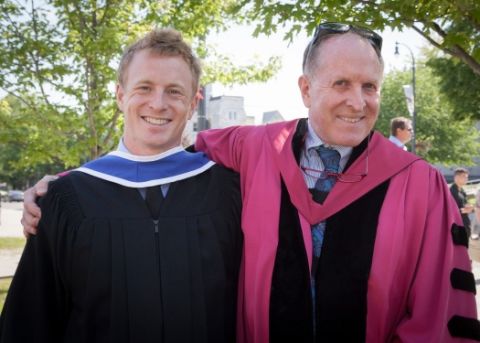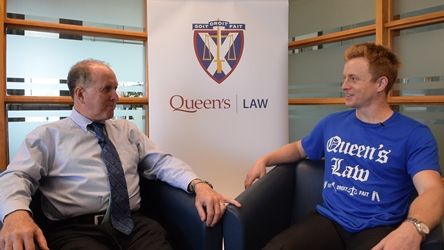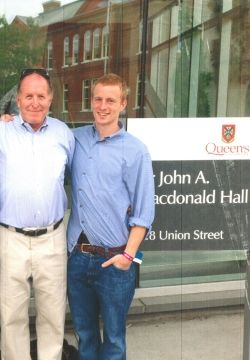


Forty years ago Nick Bala emerged from the Jock Harty Arena, in his black gown and blue hood with white trim, carrying his Queen’s Law degree. He returned to his alma mater a few years later and went on to become a pre-eminent Canadian scholar in family and children’s law. A regular fixture on the graduation stage, Professor Bala, Law’77, has watched hundreds of his students cap off their years of hard work. This spring’s ceremony saw him in an extra special role: hooding his son, Andrew, a member of Law’17.
On the morning of June 9, just a few hours before Andrew’s Convocation, both Bala men sat down with Queen’s Law Reports editor Lisa Graham to reflect on their law school experiences.
QLR: Now that it’s Andrew’s law school graduation day, how do you each feel?
Nick: I’m delighted that Andrew and his classmates are graduating. I didn’t have Andrew in any classes, but to have him as a student at Queen’s was a real pleasure for me and my wife.
Andrew: It’s been a fabulous experience; probably the best educational choice of my life. Law school has been fascinating. I’ve met great people and had a wonderful time. I think we’re uniquely positioned to adapt our interests to very interesting careers. We’ve made lifelong friends and we’re going to keep in touch. Today is going to be a great day!
QLR: Andrew, what piqued your interest in the study of law?
Andrew: It was a practical decision. People might think that all the Bala kids had going to law school in mind. I certainly didn’t. I took arts in undergrad, so I was into big ideas. Then around third year, I thought, “What am I going to do with my time practically?” Law was a pragmatic choice, but it’s been far more interesting and engaging than I thought it would be.
QLR: Nick, how did you feel when Andrew was accepted into your alma mater?
Nick: Andrew was accepted by a number of schools, but he chose Queen’s. Queen’s has an environment that really engages and supports students, so I was pleased when he came here. We, of course, set it up so that he wasn’t taking my classes, and I know my colleagues gave him an excellent education. Not only the faculty, but also the support from staff and the stimulation provided by fellow students that really make this a very special place, and he’s taken advantage of being here. We’ve been privileged to witness the student experience at close hand, and are now excited as Andrew and his classmates embark on the next stage of their careers.
QLR: What advice did Nick give Andrew about law school?
Andrew: He’s a very practical guy so there was a lot of “work hard” and “always make your own course outlines,” but also “follow your heart,” which I have done, and I have been really glad for that.
QLR: Andrew, what was it like having Canada’s leading family law scholar and a beloved professor for a dad?
Andrew: It’s been great. I’ve learned that other people respect him very much, as I do. Not everyone gets that opportunity to be in a community where their parent is so highly regarded, so that’s been a privilege. I’ve learned that he’s best known for his work in family law, which surprised me at first. I had always thought of him as being interested in contracts, a first-year subject, because he often talks about how much he enjoys teaching first-year students.
I also learned that he’s still in pretty good physical shape! There are always people playing soccer at noon on Tindall Field next to the law school, and we often found ourselves in the same pick-up game there.
QLR: How would you each describe your law school experience? What are the differences and the similarities?
Nick: There’s been a lot of change here in the 40 years since I graduated, but there is also a lot of continuity. Like Andrew, I really enjoyed my time here as a student. There were certainly times of stress and hard work, but the faculty were, as they are now, very focused on students and teaching, as well on research. The student body is still very supportive of each other. In the 1970s, we had Mary-Alice Murray (Law’60, the first Registrar of Law) doing a lot of hands-on work. While Andrew has been here, we’ve had my classmate Jane Emrich (Law’77, recently retired Assistant Dean of Students) – who was very supportive both to Andrew and to his classmates – and more staff who are involved in providing important and valuable support. Things like technology have changed legal education and society tremendously, but the core of legal education – the dialogue, the learning from professors, learning from each other, the value of clinical education at Queen’s – continues.
When I graduated we had three floors in the library and I remember then-Dean Soberman said, “Within 20 years we are going to need a fourth floor for the library.” The fourth floor was built; it’s the floor we are on now, but it became offices. In fact due to technology and computerization, the floors for the books have actually gone from three to two.
I think that the use of technology in the classrooms is very different. I’m a bit of a dinosaur in that I actually now discourage use of personal computers in the classroom; I find it so distracting. As one of my colleagues said, “I can compete with the Globe and Mail crossword puzzle, but I can’t compete with all the entertainment, information, videos in the entire world, combined with sweeties emailing or texting each other during class.”
Andrew: So, no more computers. You tried this out in your first-year classes this year. Next year he’s going to – spoiler alert! – do it in his upper-year classes, as well. It’s funny because you would think students wouldn’t like it, but in fact I know Dad’s teaching evaluations remain stellar.
Nick: I think students want to focus, but they get very distracted by computers in the classroom. Technology has, of course, dramatically changed education and the practice of law in society, but in fact if you go to a courtroom, people aren’t there playing solitaire on their laptops.
Andrew: Technology is changing legal services and communications, generally. I’ve always liked writing and teaching and I wonder if one of the big things legal service providers are going to have to do in the future is find ways of providing legal services that are more accessible to people. Access to justice is a central problem in our legal system. I know that Dad does research with law students on access to justice. When he was a student he was a Legal Aid volunteer, and later worked as Review Counsel there for a year. In my last 2 years at Queens I was a volunteer at Legal Aid also, and found this a broadening experience.
QLR: Andrew, tell us about your teaching experiences?
Andrew: I was a tutor in undergrad, and here at Queen’s I worked for two semesters with Professor Mary-Jo Maur (Law’85, LLM’93) for the undergrad law class (LAW-201: Introduction to Canadian Law). It’s a great program because you do the all the cool parts of first-year law; there is one class for every subject and the leading expert in each field teaches it, so it’s an awesome educational experience for those students. Justice David Stratas (Law’84) says, “If you can’t say something concisely and if you can’t teach it to someone else, you don’t really understand it.” Teaching is a good way of learning. Dad always says make your own course outlines, so I always did! Whenever you are writing it’s sort of a teaching exercise; you’re explaining the information so the reader can understand it. That really appeals to me.
QLR: Andrew, what area of law are you interested in, and why?
Andrew: I’m interested in litigation and will be articling at Bales Beall, a boutique firm in Toronto. They do family, estates and employment law, which is perfect for me.
QLR: Nick, what post-law school advice do you give Andrew and his classmates?
Nick: It is a very different environment now than when I graduated. Although, ironically, when I graduated in ’77 and then articled, it was already getting difficult to get permanent jobs. I think more people at that time were a lot more willing to look in smaller centres, outside Toronto or Ottawa. I have told Andrew and many of his classmates: if you enjoy what you are doing, that’s great; if not, think more widely in terms of geography, at least, or perhaps in terms of what you’re doing. I encouraged both Andrew and his older sister to go to law school because it opens a wide variety of doors. When I look at my own class, although many people ended up practising law in a traditional manner, a large number also ended up in business and government.
It’s easier to see the path back than the path ahead. Certainly plan for the next step, but I worry for people who have a 10-year plan, and miss opportunities that arise. Keep an open mind about what you want to do, and as you’re doing things, also reflect on whether you find them worthwhile and satisfying. I have felt incredibly lucky and privileged to have the career I’ve had.